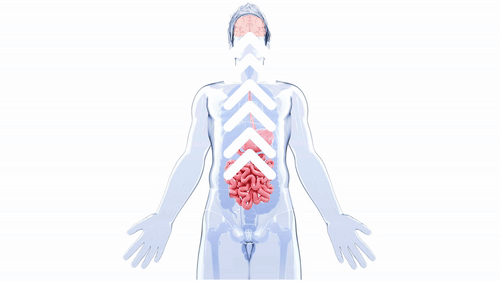When you hear the word “serotonin,” you probably think of mood, happiness, or antidepressants. But here’s something surprising: about 90% of all the serotonin in your body is made in the gut, not the brain.
That doesn’t mean your gut makes you happy in the same way your brain does—but it does mean your digestive system plays a huge role in your emotional and physical well-being. And your gut microbiome—the trillions of bacteria living in your intestines—has a major say in how much serotonin your body actually produces.
Today, we’re exploring how serotonin really works, what role your microbiome plays, and why taking care of your gut may be one of the best things you can do for your mental health.
Last week I talked about how the gut and the brain communicate, and how it’s a 2 way street. But I didn’t get into the details of how serotonin ends up in your gut. Let’s do that now.
Serotonin isn’t just a “feel-good” chemical. In the gut, it’s actually a regulatory signal produced mostly by specialized intestinal cells called enterochromaffin cells.
In your digestive system, serotonin helps:
So while gut serotonin doesn’t directly control mood—it affects digestion, inflammation, and communication with the brain, all of which influence how you feel.
This is where things get really interesting.
The gut microbiome itself produces only a small amount of serotonin directly—probably less than 5% of your body’s total serotonin. Certain bacteria, including Candida, Streptococcus, Escherichia, and Enterococcus, can make a little serotonin on their own.
But the bigger role of the microbiome is that it acts like a control system for serotonin production. Gut bacteria send chemical signals to your intestinal cells, essentially telling them how much serotonin to make.
A landmark study from Caltech in 2015 found that mice raised without any gut bacteria produced about 60% less serotonin in their intestines than normal mice. When healthy bacteria were reintroduced, serotonin production returned to normal levels.
So even though bacteria aren’t producing most of the serotonin themselves, they’re responsible for turning on your body’s serotonin factory.

Serotonin produced in the gut cannot cross the blood-brain barrier, so it doesn’t directly raise serotonin levels in the brain. But it still communicates with the brain in other powerful ways—especially through the vagus nerve, which connects the two systems.
Through this communication, gut serotonin can influence:
An imbalanced microbiome—called dysbiosis—can disrupt this signaling. The result can be poor digestion, inflammation, and mood changes such as anxiety or brain fog.
In other words, your gut doesn’t produce happiness directly—but it helps determine how your brain experiences it.
Several factors influence how well your gut produces and regulates serotonin:
If you want to support both your digestion and your mental health, start by optimizing your gut environment.
Here’s how:
When you care for your gut, you’re also supporting your brain’s resilience, clarity, and stability.
Serotonin may be known as the “happiness molecule,” but most of it is made right inside your gut. Your microbiome helps control how much you produce, how it’s released, and how well your brain receives the message.
So if you want better digestion, calmer moods, and clearer thinking, don’t just focus on the brain—start with the gut. Because when your gut is healthy, your entire nervous system works better.
And if you need help doing that, give us a call at the IBS Treatment Center. Distance is not an obstacle. We’ve been working with patients all over the world via telemedicine since 2005, and we can help you too.
From Gut to Brain and Back Again: How They Impact Each Other
Pseudomonas Overgrowth in the Gut: Symptoms, Challenges, and Treatment Options
Gut-Sinus Connection: The Surprising Link Between Gut Health and Chronic Sinus Problems
Seattle: 206-264-1111
Los Angeles: 310-319-1500
Our WhatsApp: 206-791-2660
Copyright © 2024 IBS TREATMENT CENTER. All Rights Reserved
Lorem ipsum dolor sit amet, consectetur adipiscing elit. Suspendisse varius enim in eros elementum tristique. Duis cursus, mi quis viverra ornare, eros dolor interdum nulla, ut commodo diam libero vitae erat. Aenean faucibus nibh et justo cursus id rutrum lorem imperdiet. Nunc ut sem vitae risus tristique posuere.